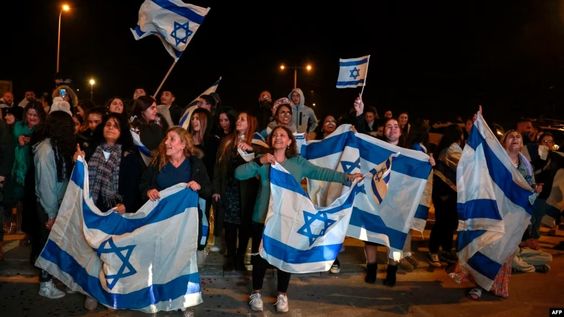World
Hostages and prisoners exchanged between Israel and Hamas

On Wednesday, the sixth and maybe last day of a ceasefire between the combatants, Hamas militants released sixteen prisoners, and negotiations aimed to prolong the ceasefire and release other hostages in return for Palestinians detained in Israeli jails.
Four Thai nationals and five Israeli women, three children, and two young males were set free. Two Russian Israeli women, ages 50 and 73, had earlier been sent free by Hamas in a separate release. In exchange, Israel freed 30 Palestinians from detention early on Thursday, among them the well-known activist Ahed Tamini.
On Wednesday, the sixth and maybe last day of a ceasefire between the combatants, Hamas militants released sixteen prisoners, and negotiations aimed to prolong the ceasefire and release other hostages in return for Palestinians detained in Israeli jails.
Four Thai nationals and five Israeli women, three children, and two young males were set free. Two Russian Israeli women, ages 50 and 73, had earlier been sent free by Hamas in a separate release. In exchange, Israel freed 30 Palestinians from detention early on Thursday, among them the well-known activist Ahed Tamini.
A few hours prior to the truce’s expiration, Hamas stated that Israel’s offers to prolong it once more were insufficient.
The source told Agence France-Presse that the discussions were centred on extending the pause by “two days or more,” and that “what is being proposed in the discussions to extend the truce is not the best.”
According to media sources, Israel’s military cabinet gathered late on Wednesday as well, but no declaration was made.
Top officials from Qatar, the United States, Egypt, and Israel were meeting in Qatar to decide how long to extend the cease-fire so as to permit additional hostage and prisoner swaps, since the cease-fire is scheduled to formally end at 7 a.m. local time on Thursday.
The United States Secretary of State, Antony Blinken, reached Israel. In Brussels earlier, he informed reporters that an extended ceasefire “means that more hostages will be coming home, more [humanitarian] assistance will be getting in” to support Gaza’s displaced Palestinian population.
Blinken stated, “That’s obviously something we want.” “I think Israel is also interested in it. Additionally, they have a strong focus on returning their people home.”
Qatar told CNN that it was “very optimistic” that the cease-fire would be extended, probably on the same conditions as the first six days, and that roughly three times as many Palestinians detained in Israeli jails for various offences would be released as hostages by Hamas, an organisation that the US, the UK, the EU, and other countries have designated as terrorist.
The Washington Post was informed by an Israeli official that while the truce might be prolonged for an additional two or three days, more violence would not “lead to a permanent cease-fire.”
Following Hamas’ unexpected onslaught on southern Israel on October 7, which resulted in the deaths of over 1,200 people and the release of approximately 240 captives, the official stated that the “goal of removing Hamas from its rule in Gaza” remained the primary purpose for the Jewish state. As a result, the Gaza Health Ministry, which is under the leadership of Hamas, reports that over 15,000 people have died as a result of an Israeli airstrike and ground invasion of Gaza.
The Israeli army’s chief of staff, Lieutenant General Herzi Halevi, has given his approval to plans for “the continuation of the fighting” in Gaza after the ceasefire concludes, the Israel Defence Forces announced on Wednesday.
Three hostages—Kfir Bibas, age 10, his brother Ariel, age 4, and their mother Shiri Silberman Bibas—were slain at an unspecified moment during the Israeli shelling of the Gaza Strip, according to a statement released by Hamas on Wednesday. The Israeli army declared it was looking into the accusation made by Hamas.
Under the terms of the original Israel-Hamas truce, Israel was to halt its battle to destroy the militant Hamas group for four days in exchange for Hamas releasing 50 hostages it had taken during an attack on Israel last month and Israel freeing 150 Palestinian inmates. Increased humanitarian aid could now reach the Gaza Strip, which has been hammered, thanks to the ceasefire.
A two-day extension was agreed upon, provided that Israel released more prisoners and that Hamas released 10 more captives per day.
Twelve hostages, comprising two foreigners and ten Israelis, were reportedly driven to Israel late on Tuesday, with further hostages being taken Wednesday night, according to the Israeli military. According to the semiofficial Palestinian Prisoners Club, Israel released 30 Palestinian inmates on Tuesday, comprising 15 women and 15 young males, from a detention centre in Jerusalem and a jail in the West Bank.
After six weeks of intense Israeli aircraft bombardment and a ground offensive sparked by the Hamas raid, Gaza has had its first reprieve thanks to the six-day truce.
The UN estimates that 1.8 million of the 2.3 million people living in Gaza have fled their homes as a result of Israeli shelling, with many of them sheltering in overcrowded shelters. More than 60% of Gaza’s housing stock has been damaged or destroyed, according to a report released last Friday by Shelter Network, an aid partnership run by the United Nations.
Due to Gaza’s overcrowding and the interruption of its water, sanitation, and health infrastructure, the World Health Organisation issued a warning on Tuesday about the high danger of “explosive outbreaks of infectious diseases”.
Nike Ching, the bureau chief for VOA’s State Department, contributed to this article. Reuters, Agence France-Presse, and The Associated Press provided some of the information for this article.
